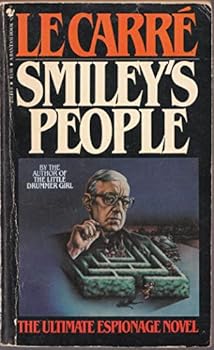John le Carré's Definition of Fear
When I think about the United States in its present state, I find myself fantasizing about a Monty-Python existential-skit narrated by Michael Palin: "Who am I? Where am I? Am I going in circles? Why am I going left when I should be going right? Am I following a leader, or am I being chased by an enemy?" At the root of the hilarity lies a cold pit of angst in our stomachs, which we cannot allow ourselves to name, disunity and mistrust.
So I went back to John le Carré's novel from 1979 Smiley's People for instruction. Le Carré tells the story of an elderly Russian emigré who is shot to death in London's Hampstead Heath, a large city- park. The British spy-hunter George Smiley has to interview the last people who saw the Russian alive. The witnesses bear a special burden: they are suspects, but they could also become the next victims.
When Smiley interviews Toby Esterhase, a retired spy-hunter and emigré, he notices that Toby is carrying a firearm, a sure sign that he fears assassination from the same person who murdered the Russian. Smiley realizes he needs to pass on a bit of spy-philosophy to Toby in order to help him cope, and to make him tell Smiley what he knows about the elderly Russian's death:
"You remember what we used to say at Sarratt, Toby—about fear being information without
the cure? How we should respect it? Well, I respect yours, Toby. I want to know more about
it, where it came from, whether I should share it. That's all."
Americans need to apply that same philosophy to their corporate life. As a Republican, I speak to other Republicans, but I also speak to every American. We have the same problem as the Britons, information without the cure. If anything, we have an overload of information that needs curing. It hangs over our heads like a Damocles-sword.
As the leader among the World's nations, we have all the responsibility for it, like parental figures. We also get all the blame for it, and no respect. For the average American, this kind of information overload creates an untenable position, an unbelievable amount of stress. We have to fight a war of attrition on our nerves everyday.
Our leadership-class has to divide its time too thinly between maintaining unstable coalitions and ever-evaporating consensus. Our leaders can only get anything done through compromises, which is fine until we find out how much of our strength we have traded away just to get legislation passed. The compromises satisfy no one. We just take stock of what we have lost and try to get it back the next time; and the extreme-level of browbeating, accusations, and threats never stops.
Try putting yourself in the position of a Congressman or President facing the media circus, having to answer a barrage of rapid-fire questions with a ready-made stock of talking-points. Most viewers have no idea what either the questioner, nor the politician, is saying. It reminds me of the old sci-fi concept of hyperspace. The next time the politician appears for an interview, the questioners make him recapitulate his answers and compare them to his most recent statements, and harrangue him over his inconsistencies.
No wonder our politicians create mistrust among their constituents. Look at the courtroom theatrics they have to put up with—not just from the news-networks but from the plethora of interest-groups fighting for influence. They gain clout by with accusations. As I said at the beginning, antagonism and mistrust contribute to our disunity. We cannot continue like this. It is as simple as that.


